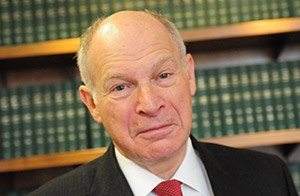Lord Neuberger, president of the UK Supreme Court, has defended London’s prospective status as a legal hub in the international sphere after Brexit, in a 3 July speech in London.
On the status of London after the EU referendum and Brexit, Neuberger told the Australian Bar Association Biennial Conference that judges were determined that the UK’s departure from the European Union ‘will in no way undermine London’s status as the world centre for legal services geneally and dispute resolution in particular.’
‘The common law which is so attuned to the needs and realities of the commercial world, will remain as attuned to the demands of international business as it ever was’.
He said it was a ‘spur’ for London legal services to improve. He added: ‘Left to our own common law devices we will in some respects be able to react more quickly and freely to developments in our fast-changing world.’
Neuberger also said there was a ‘serious problem’ with access to justice for ordinary citizens and small and medium-sized businesses, arguing that many people faced difficulty in being able to access and understand the law.
He condemned the government for failures to provide adequate access to justice for ordinary citizens.
Speaking on both access to law and access to legal advice and representation, Neuberger described the UK government’s failure to update its statute website with repeals and amendments as ‘little short of lamentable’. He also stated that while UK citizens enjoy rights afforded to them by the UN Universal Declaration of Human Rights and the European Convention on Human Rights, the lack of affordable legal representation makes them unenforceable.
‘It has faint echoes of the familiar and depressing sight of repressive totalitarian regimes producing wonderful constitutions and then ignoring them’, Neuberger commented. However, he added that the legal profession had ‘an equal duty’ to improve access to justice.
Ed Sparrow, a partner at Ashurst and chairman of the City of London Law Society (CLLS), agreed that law firms had a part to play in improving public access to justice, but argued that the profession did ‘a vast amount already.’
Sparrow said that the pro bono initiative ‘collaborative plan’ exemplified how lawyers were working to improve access to justice. The plan’s participating firms have a 25 pro bono hours average annual target, per UK fee-earner.
Neuberger, later in his speech, also threw support behind a move to implement electronic filing in UK courts, which would result in a reduction of trial time and the expense involved in trials. This would make court proceedings more ‘cost-effective’ for all, particularly when considering the amount of court costs in relation to damages sought.
Aligned with this, he said that greater uptake of mediation would ‘substantially cut down the costs, delay and aggravation of litigation.’
Neuberger pointed to an online dispute resolution (ODR) system used by eBay, which costs $15 to use, as ‘a useful signpost and an encouraging – if heavily distinguishable – precedent’ for a similar system to be used for UK courts.
The Supreme Court president added that English and Welsh courts will introduce ODR for resolving small civil claims as soon as the necessary IT and training can be rolled out.
‘There may well be a risk that ODR will lead to more imperfect justice than traditional systems of resolving disputes in court, but I am firmly of the view that the resolution of disputes provided by the state should be proportionate to the issues involved’, Neuberger said.










